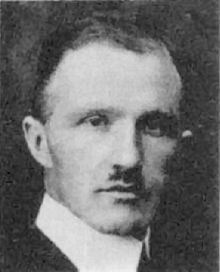Christian Mergenthaler | |
|---|---|
 Mergenthaler in 1924 | |
| 7th Ministerpräsident of Württemberg | |
| In office 12 May 1933 – 21 April 1945 | |
| Preceded by | Wilhelm Murr |
| Succeeded by | Position abolished |
| Culture Minister, Württemberg | |
| In office 15 March 1933 – 21 April 1945 | |
| Preceded by | Wilhelm Bazille |
| Succeeded by | Position abolished |
| Justice Minister, Württemberg | |
| In office 15 March 1933 – 12 May 1933 | |
| Preceded by | Josef Beyerle |
| Succeeded by | Jonathan Schmid |
| Landtag President, Württemberg | |
| In office April 1932 – 15 March 1933 | |
| Preceded by | Albert Pflüger |
| Succeeded by | Jonathan Schmid |
| Additional positions | |
| 1924–1928 1929–1933 | Württemberg Landtag Deputy |
| 1924 | Reichstag Deputy |
| Personal details | |
| Born | 8 November 1884 Waiblingen, Kingdom of Württemberg, German Empire |
| Died | 11 September 1980 (aged 95) Bad Dürrheim, Baden-Württemberg, West Germany |
| Political party | Nazi Party |
| Other political affiliations | National Socialist Freedom Party Völkisch-Social Bloc |
| Profession | Schoolteacher |
| Military service | |
| Allegiance | |
| Branch/service | Imperial German Army |
| Years of service | 1908–1909 1914–1919 |
| Rank | Oberleutnant |
| Unit | 13th (Hohenzollern) Foot Artillery Regiment 24th Reserve Foot Artillery Regiment |
| Battles/wars | World War I |
Julius Christian Mergenthaler (8 November 1884 – 11 September 1980) was a German Nazi Party politician who served as the Ministerpräsident and culture minister of Württemberg for nearly the entire duration of Nazi Germany. He served as a deputy in the Württemberg Landtag for nine years, and in the Reichstag for one term. He was also a member of the Nazi paramilitary organization, the Sturmabteilung (SA), and rose to the rank of SA-Obergruppenführer. After the end of the Second World War, denazification proceedings judged him to be a major offender and he was interned for four years.